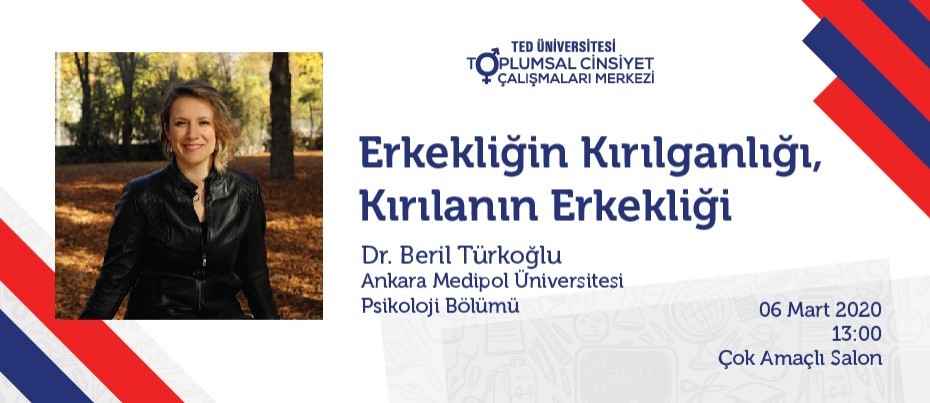
On March 6, 2020, an event titled “Vulnerability of Masculinity, Masculinity of the Vulnerable” was held with Asst. Prof. Beril Türkoğlu.
“Although it has different manifestations in different societies around the world, masculinity has always been a ‘condition’ that is expected to be socially constructed and gains its social identity and status through performance. In some tribal societies, a man is expected to perform risky behaviors, acts of violence, and courageousness to become a ‘real man.’ For example, in African tribes, to ‘become a man’ and deserve to be married, one must be able to kill a large animal without tools, hunt, or show in various ways that they can withstand pain. Although the self-assertion mechanism of masculinity does not proceed in the same way in modern social structures, it continues more implicitly through different social and cultural institutions. To give an example from Turkish society, a boy takes his first step towards becoming a ‘man’ through circumcision, which is witnessed by the entire community and is performed at the discretion of that community. The race to become a man continues with military service, finding a job to earn money, and starting a family. While the concept of ‘gender’ essentially points to gender practices constructed by the sanctions of society, the most fundamental question that points to fragile masculinity is why it is only men, and not women, who are allowed to prove themselves and gain appreciation through social situations and performances. The performative structure of masculinity that changes over time, space, and cultures is an important issue that has been questioned and continues to be questioned in social sciences since the 1970s. In the context of social psychology, this issue is discussed and researched on the axis of the Theory of Fragile Masculinity. The Theory of Fragile Masculinity defines masculinity as a socially acquired status that can be lost as well as gained and is vulnerable to threats. In the face of threat, it argues that it turns to various practices that reconstruct (normative) masculinity. In these social practices, receiving the approval and appreciation of others mediates the restoration of shaken masculinity. Studies conducted in Türkiye show that masculinity is generally perceived as threatened in situations where women are superior; when men’s role as ‘protector-carer,’ head of the family, and decision-maker is questioned. As a result of the perceived threat to different spheres of traditional masculinity, men turn to the forms and behaviors made possible and approved by the ideology of masculinity to reposition their position of power. For example, studies show that men who perceive threats to their masculinity show more violence and anger towards women and LGBTI+ people, engage in more sexist discourses, increase prejudice and discrimination practices against those who do not conform to gender norms, exhibit more risky behaviors and even drive more angrily in traffic. Fragile masculinity has only just begun to be discussed in the context of social psychology in Türkiye. Replication studies were conducted in Türkiye on fragile masculinity research, which was conducted according to American ideals of masculinity and social order, and it was revealed that masculinity in Türkiye is seen as a social position that can be earned/elevated through performance compared to femininity. In contrast, femininity is defined in terms of more physical and hormonal characteristics and is therefore perceived as an essentialist gender identity that cannot be changed and developed through social acts and efforts. In this case, while it is considered reasonable for masculinity to redeem itself in cases where it makes ‘mistakes’ and to do so by subordinating women and LGBTI+s, it is not seen as possible for women to rebuild themselves through social acts and gain appreciation in cases that society sees as ‘mistakes’. In this sense, how people perceive masculinity and femininity shapes their responses to gender-based inequalities, violence, prejudice, and discrimination, and continues to be a serious obstacle to the reduction of these situations.”
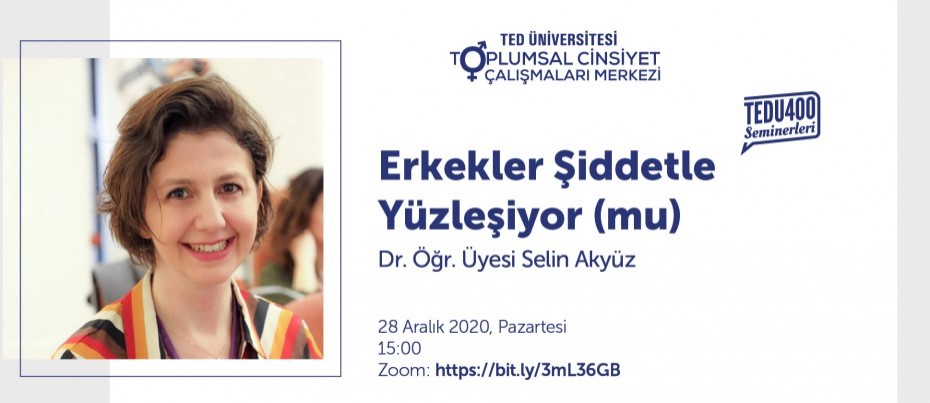
On 28 December 2020, a TEDU 400 seminar titled “(Do) Men Face Masculine Violence” was held with Asst. Prof. Selin Akyüz.
“Critical Masculinity Studies, which started to be studied intensively in the world in the late 1970s, were only reflected in Turkey in the late 1990s and early 2000s and then increased rapidly. Today, the field continues to evolve by being accepted as part of gender studies – or being subject to less resistance. Fueled by feminist activism and academic studies, the field has provided researchers with a new lens in an order where social problems, inequalities, and discriminations are crystallized by neo-liberal policies and growing right-wing populism. If gender is not just about the role of men and women and goes far beyond the discussions about the ‘nature’ of the gender, we should begin by considering masculinity as a ‘position’ that makes it easier for us to point out the differences that feed on categories such as sexual orientation, class, language, religion, race, and ethnic identity. It will be mind-opening. This includes questioning the understanding that emphasizes masculinity and male values. Especially violence provides an important analytical field in this context. Undoubtedly, in the historical process, patriarchy has left behind the period when only male dominance was attributed to biology and read through bodily strength. The modern state building, its means of domination, the order of capitalist production, and modern medicine have been decisive in determining the hierarchy and counting it to men’s credit and have changed in the process. In this context, it would be incomplete to analyze the gender order independently of local and cultural specificities. However, although the field and its concepts have undergone significant change and erosion, some subjects still have not moved away from the old acceptances. The ‘link’ between violence and masculinity still has not broken with old definitions and acceptances. It is also extremely common for men to be accepted as the sex capable of using violence and this is constantly reproduced by biological or social dynamics. Similarly, the stance that most visibly explains the violence of men against women and other men for reasons such as ‘protection,’ ‘anger control problem,’ and ‘survival instinct’ is strengthened with the support of structural arrangements that make masculine violence possible. For example, it is extremely problematic to see domestic violence as the honor of the family, the man’s use of his power to protect and watch over women/his wife/child’s mother, because it shadows its systematicity and prevents its politicalness from being questioned.”
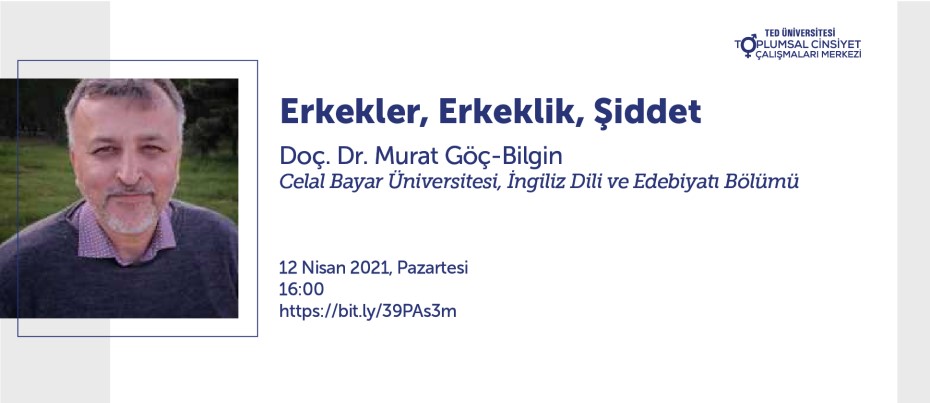
On April 12, 2021, a seminar titled “Men, Masculinity, Violence” was held with Assoc. Prof. Murat Göç-Bilgin.
“This presentation aims to discuss the relationship between masculinity, patriarchy, and violence in different aspects. The construction of masculinity is intertwined with many physical forms of violence. The process of becoming a man is the process of being both the perpetrator and the object of violence in many different forms, from physical violence to economic and verbal violence. From childhood to adulthood, men normalize, generalize, and rationalize violence at many stages. For this reason, violence is a way of being for men. They learn to express themselves and relate to others through violence. Men build and make sense of their relationships with their fathers, peers, women and LGBTI+s, nature and technology, and politics and social institutions through violence. Men who lose their identities in the spiral of violence resort to violence more to find themselves and make their existence meaningful; violence is both the power from which men take their existential energy and an enemy that consumes them from the inside.”
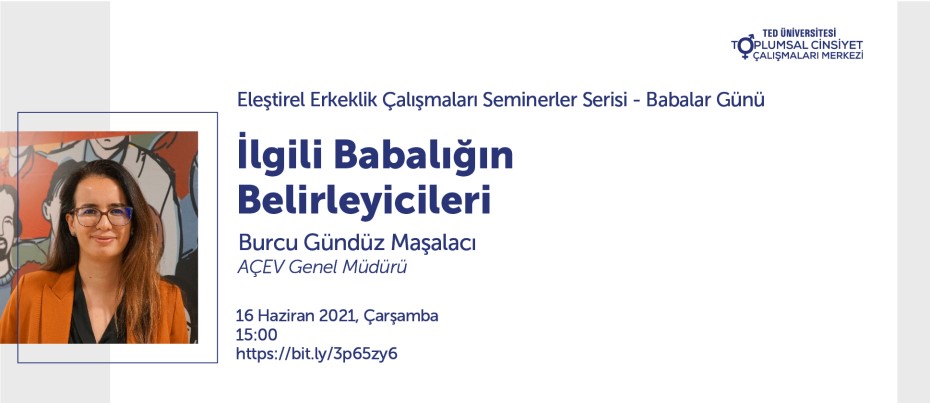
On June 16, 2021, a seminar titled “Determinants of Involved Fatherhood” was held with Burcu Gündüz Maşalacı from the Mother Child Education Foundation (AÇEV).
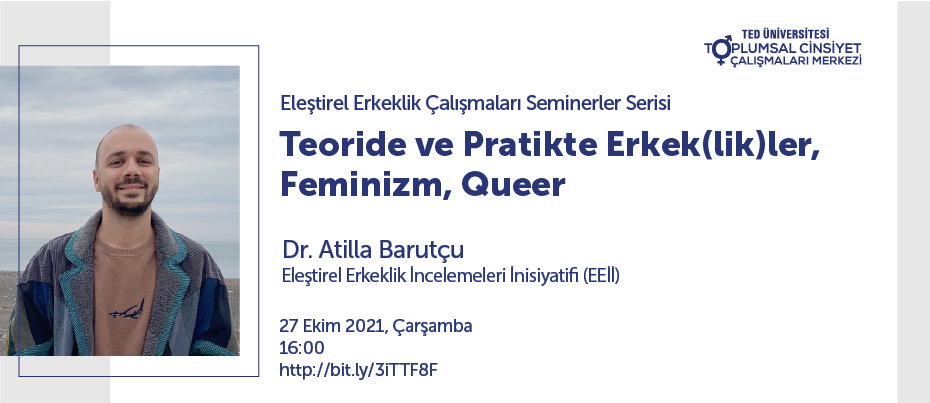
On October 27, 2021, a seminar titled “Masculinities, Feminism, and Queer in Theory and Practice” was held with Dr. Atilla Barutçu.
“In this presentation, I will focus on the relationship between the field of critical masculinity studies and feminism and queer studies, which I think has been overlooked at some points. I will emphasize that these three fields should not be considered independent of each other both in the theoretical debates in the academic community and in the impact of these debates on the struggle for gender equality, and I will touch upon the visible and/or implicit commonalities between them. For this purpose, first of all, I will draw your attention to the theoretical and methodological association of critical masculinity studies with feminism in its process of evolving as a separate field and gaining its identity, and then I will discuss the aspects of this unity that I think should receive support from queer today. In doing so, as an academic working in the field of critical masculinity studies, I will also present a critical approach to the field from within the field and reflect on how these three fields intersect in today’s debates.”
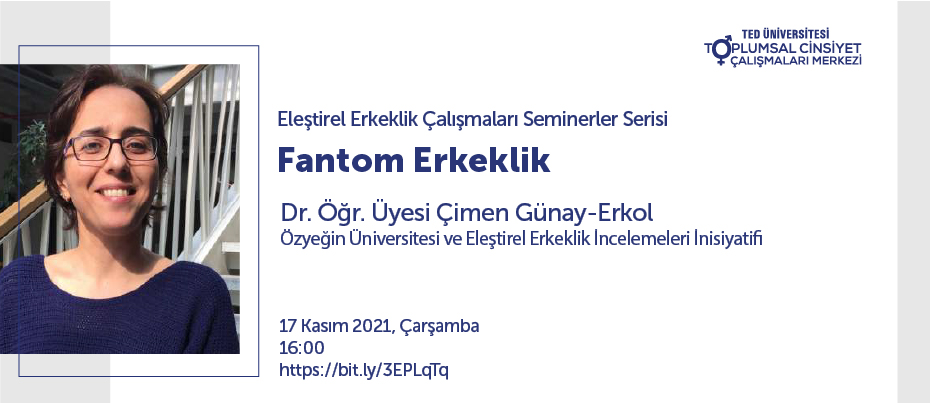
On November 17, 2021, a seminar titled “Phantom Masculinity” was held with Asst. Prof. Çimen Günay-Erkol.
“In this speech, I will discuss the theoretical blockage in the field of critical masculinity studies around the concept of ‘hegemonic masculinity’ and why the concept of ‘contained masculinity’ has failed to overcome this blockage. Through the concept of ‘phantom masculinity’, I propose to highlight men not for what they have gained, but for what they have lost. I propose the concept of ‘phantom masculinity’ to describe the anxiety caused by the loss of masculine power, like the phenomenon of ‘phantom pain,’ which describes the pain of lost limbs. French surgeon Ambroise Paré, considered the ‘father’ of forensic medicine, observed the phenomenon of phantom pain after amputation operations. Paré first used phantom pain (phantomschmerz) in his article ‘Harquebusses and other guns’ (dated 1552 or 1554). It is a pain felt in the lost limb; soldiers coming out of surgery claim that their severed limbs ‘ache’ as if they were still there. Just as the pain of a limb that is no longer there can be felt, the pain of a ’male power’ that is worn out, lost, and mourned can be traced through this conceptualization. By giving examples from literature, I also want to show how literary works offer valid ways to illuminate intimate issues of masculinities.”
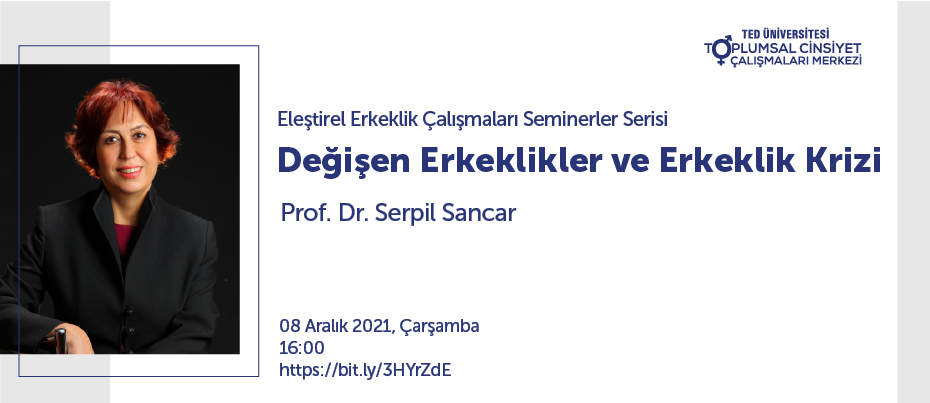
On December 8, 2021, a seminar titled “Changing Masculinities and Masculinity Crisis” was held with Prof. Dr. Serpil Sancar as part of the Critical Masculinity Studies Seminar Series.
“In male-dominated societies, where the founding values are strength, rationality, and aptitude for science, masculinity is defined as being fearless, taking risks, and enduring physical pain. Men are charged with the responsibility of ensuring the security of society. Within the framework of heterosexist culture, men’s sexual freedom is considered inviolable, while the purchase of women’s bodies with money is seen as natural. The opposite is true for femininity and women who cooperate with male domination are rewarded. However, important changes have occurred in the process. The modern family model, in which men were the head of the family and the breadwinners, was transformed when men began to share the responsibility of earning a living with women. The norm of ‘dominant fatherhood’ has changed, and the father figure who earns money but does not spend time with his children has been replaced by a new father figure who attaches importance to establishing an emotional relationship with his children. Practices based on compulsory military service and the mass education system in barracks have weakened. Middle and upper-class men started to refrain from military service. The legitimacy of heterosexual masculinity and heterosexuality as the only type of sexuality disappeared and the LGBTI+ movement gained strength. Men who are in favor of equality between the sexes, who reject homophobic masculinity and heterosexist perspective by considering the criticisms of the LGBTI+ movement, and who want to change the dominant masculine values and norms have started to speak out. Thus, the hope for an egalitarian social transformation whose subject and object are men has emerged. On the other hand, all these changes frighten masculinities and make men’s authority as the head of the family unsustainable. Having lost authority in the family, men try to maintain their position and subjugate women by using violence. In parallel to this situation, an anti-women (misogynist) men's movement has emerged and started to argue that women's rights and women’s emancipation are not suitable for the structure of society and family, that the legal rules protecting masculinity (early marriage, restriction of the right to alimony, etc.) should be maintained and that LGBTI+ rights would disrupt public order. Therefore, alongside an egalitarian social transformation, we are confronted with a development that puts social peace and democracy at risk."
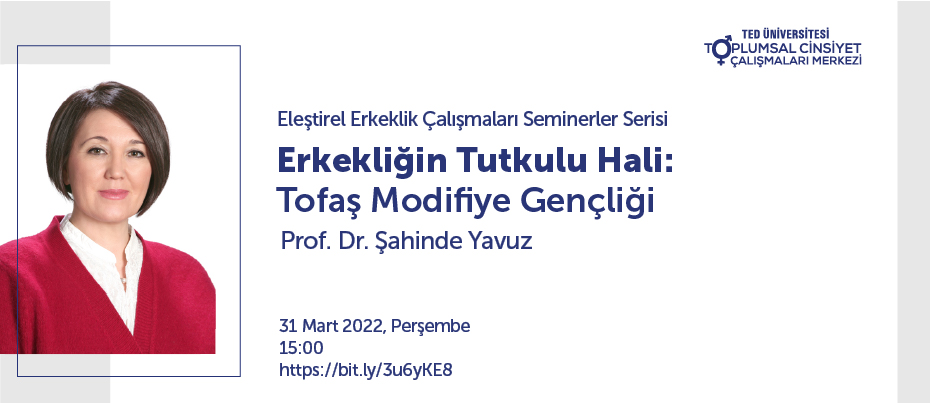
On March 31, 2022, a seminar titled “A Passionate Mood of Masculinity: ‘Modified Tofaş’ Youth” was held with Prof. Şahinde Yavuz.
“Assumptions about masculinity have changed since the second half of the twentieth century. While the privileges of masculinity persisted in economic and social terms, with the increasing inclusion of women in the labor force, work, family, and gender identities also changed, and the distinctions between the private and public spheres, where identities were shaped, began to lose their former certainty. Economic change has also transformed the cultural sphere. The field of consumption has also changed in parallel with this change, and consumption has become an indispensable part of the sense of identity, especially among young men. The relative constancy that modern capitalist society provided in class, gender, and personality roles threatens displacing codes that have been eroded and established in the postmodern period. Like all post-identities, ‘masculinity’ has a very changeable, unstable, and fragmented structure. Subcultures react differently to the domesticating, commercializing wave of capitalism. Subcultures are the cultures that conform to the norms of the culture within the social structure but exist by creating their norms. This research considers young men who drive Tofaş brand modified cars as members of a subculture and aims to find out how men belonging to this group live their masculinity, how they experience their masculinity, and how they construct their identities outside of what is accepted/legitimate within the urban fabric. The paradox created by the necessity of establishing a coherent structure in an environment where what is fixed, and tradition is constantly undermined also encompasses masculinity. In this sense, owning Tofaş modified cars appears as a form of individuality. The masculinities experienced by young people depending on the maneuver they have because of their cars to experience individuality and differentiation will help to understand modern masculinity. The research aims to find out who these young people are, the language they use among themselves, the style of clothing and hairstyles, music, and the way they spend their leisure time.”
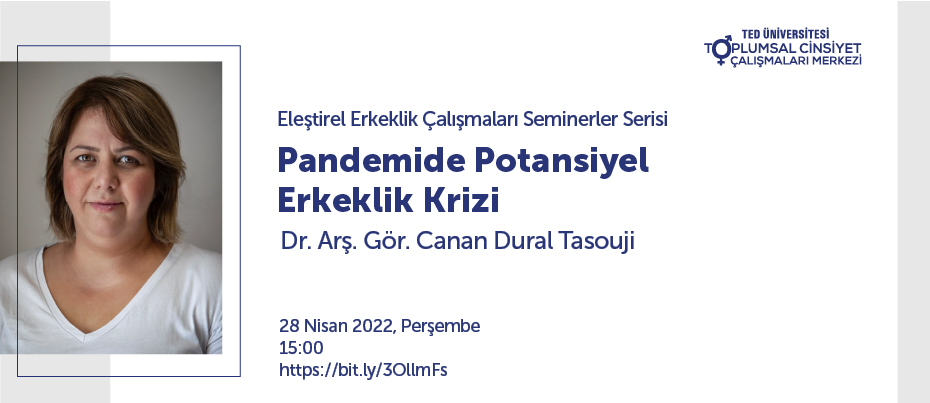
On April 28, 2022, a seminar titled “Potential Masculinity Crisis during the COVID-19 Pandemic” was held with Research Assistant Dr. Canan Dural Tasouji.
“Pandemics create various changes in the social, economic, political, and psychological structure of the societies in which they are born. As an important component of the social dimension of the Covid-19 Pandemic, gender has greatly shaped the social impact of the crisis. It is determined by the results of this effect, from the incidence of diseases and deaths to the gender of health care workers and other frontline workers, from the distribution of work in the home to the rates of domestic violence. Examining the gender dimension of the Covid-19 pandemic and its effects on gender is an important area of research for social scientists. This study aims to understand the change created by the experience of being at home and working from home during the epidemic as a crisis and an opportunity for change in masculinity roles. In the study, which was designed as qualitative research, in-depth interviews were conducted with male participants living in different cities, with different educational, age, and socio-economic statuses, selected through snowball sampling, and who experienced being at home/working from home for different periods during the pandemic, and the data were analyzed using descriptive analysis. The men interviewed stated that they participated more in housework and childcare during this period and that they experienced changes in the sexual division of labor and role distribution within the household. Even if it is too early to characterize the extent of this change as a transformation in dominant masculinity values, it is thought that it is important to understand that working from home and flexible working after the Covid-19 Pandemic will be permanent for both men and women, the new position of the home as a working space and the rupture this situation will create in states of masculinity as a ‘crisis’ and an opportunity for change.”
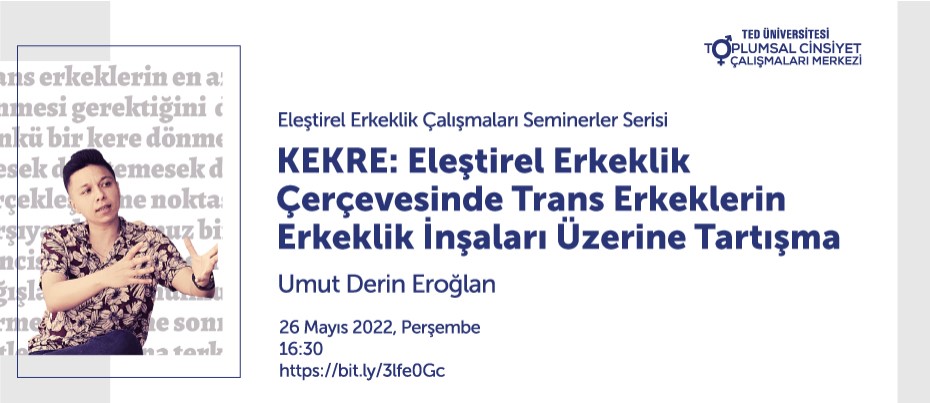
On May 26, 2022, a seminar titled “KEKRE: A Discussion on the Trans Men’s Masculinity Constructions in the Framework of Critical Masculinity” with Umut Derin Eroğlan.
“KEKRE Documentary focuses on the experiences of masculinity performances positioned as ‘other’ against the hegemonic understanding of masculinity and aims to reveal the construction of the dominant masculinity performance in society. In the documentary, different experiences of the social construction of the representation of masculinity are shown through seven ‘other’ performances, which point to various forms of masculinity whose performance is not limited to single masculinity, and the hierarchy and vulnerabilities within different experiences of the social construction of the representation of masculinity are shown through seven ‘other’ performances, which point to various forms of masculinity whose performance is not limited to single masculinity, and the hierarchy and vulnerabilities within different performances of masculinity. The documentary deals with the assigned/constructed masculine identity of people who have experienced and/or experienced masculinity and its effects on other identities of masculinity. Ultimately, the documentary seeks to answer the question ‘Which masculinity?’ KEKRE reveals that every experience of masculinity is unique. We invite you to create a transgender view of masculinity from a place that is also the subject of the documentary and to discuss the constructions of masculinity of other men - especially transgender men - within the framework of critical masculinity.”
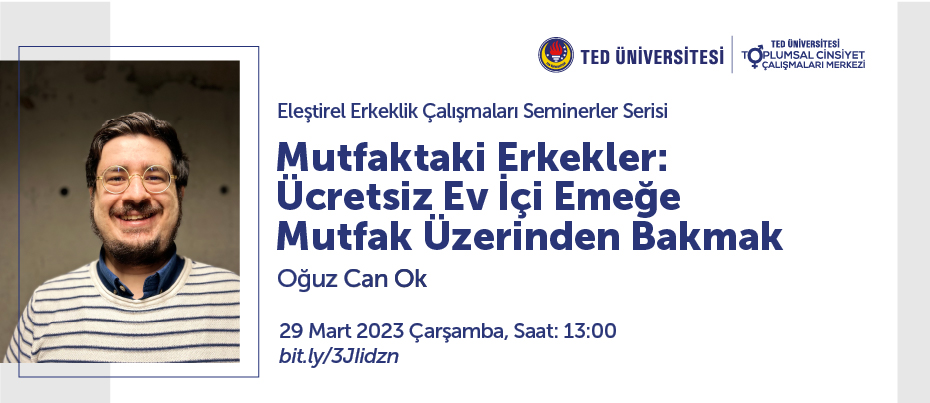
On March 29, 2023, a seminar titled “Men in the Kitchen: Looking at Unpaid Domestic Labor Through the Kitchen” was held with Oğuz Can Ok.
“Looking at quantitative data such as time use surveys, it can be seen that women in Turkey still spend more time on unpaid domestic labor. One of the areas where domestic gender inequalities arise is the issue of food preparation. The data also reveal that women spend more time on free labor than men in matters such as preparing food at home (Eurostat, 2018). It can be said that these data are in line with the discussions of the role of the ‘feeder of the family’ imposed on women and the significant invisible unpaid labor burden that this entails, which have been mentioned in feminist literature for many years. Although professional kitchens are a male-dominated area, responsibility in home kitchens should be evaluated with all these discussions, and kitchens should be included in the research in terms of the ways in which gender inequalities arise. In addition, behaviors of men who are actively involved in kitchen activities other than behavioral norms are also an area that need to be examined. Besides the possibility that the involvement of men in kitchen activities can be a step to reduce these inequalities, it can constitute a maneuver area to cover inequalities and create new equalities such as the behaviors described by Bridges and Pascoe (2014) as ‘Hybrid Masculinities.’ The aim of the research, the outputs of which will be presented in this seminar, is to examine the representations of masculinity produced by men who take active responsibility in kitchen and cooking in Turkey from the perspective of Critical Masculinity Studies. For this purpose, a total of 51 semi-structured in-depth interviews were conducted with men and their partners who have shared the same house with their partners for at least 2 years. The data obtained in the field study were analysed by content analysis. The most important finding that emerged after the analysis is that men’s participation only in kitchen activities can create a suitable environment for hybrid masculinity maneuvers without creating a suitable ground for an egalitarian masculinity construct in all activities that require unpaid domestic labour. This can act as an impetus for new inequalities and social pressures for their partners.”
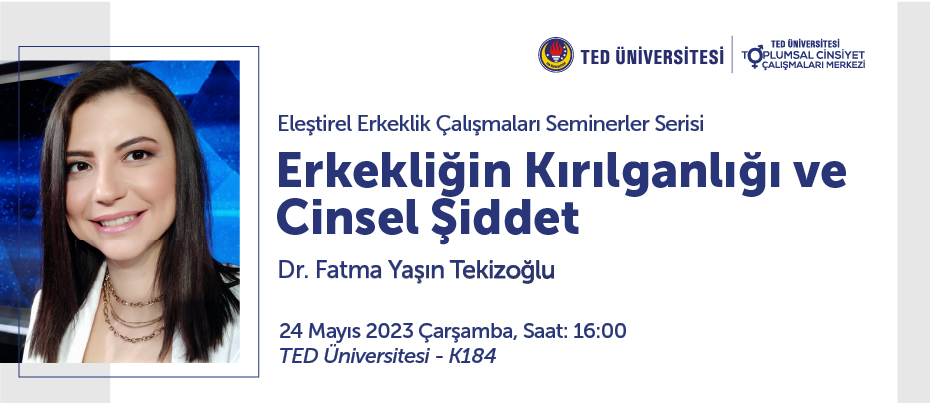
On May 24, 2023, a seminar titled “Fragility of Masculinity and Sexual Violence” was held with Dr. Fatma Yaşın Tekizoğlu.
“The status of masculinity is not acquired at birth; it is earned through gender expectations and consistent behaviour. The status of deserved masculinity does not last forever. On the contrary, the first time one does not behave ‘like a real man,’ it is lost, and in order to become a ‘real man,’ society has to be convinced of this again. Fragile Masculinity Theory argues that much of men’s anxiety about being a ‘real man’ stems from a fundamental assumption about the nature of masculinity: Masculinity is a status that is hard to gain but easy to lose and requires constant social proof. The most effective strategies used to prove or regain masculinity are risky (expressing courage), difficult (making imitation difficult and costly) and visible to others’ behaviors. Therefore, although not always visible, aggression is one of the most frequently used ways of proving or reconstructing masculinity. As the traditional gender system encourages men to be sexually dominant and aggressive, sexually aggressive behaviour is a common and accessible way to (re)assert their masculinity. Although research on the relationship between perceived masculinity threat and aggression has mostly focused on physical aggression, insecure masculinity beliefs or masculinity norms are known to have a strong relationship with sexual aggression. Accordingly, this presentation will focus on the effect of perceived threat to masculinity on sexually aggressive behaviours.”
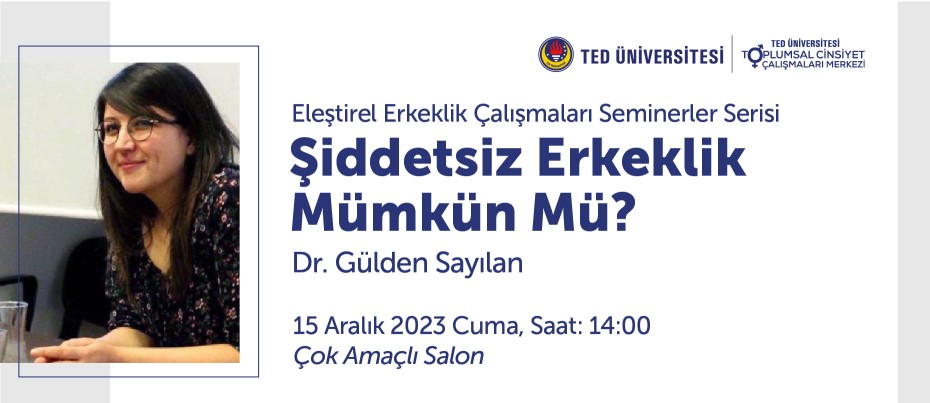
On December 15, 2023, a seminar titled "Is Nonviolent Masculinity Possible?" was held with Dr. Gülden Sayılan.
"In addition to being a significant social issue, gender-based bias, discrimination, and violence constitute a public health concern that adversely affects the lives of disadvantaged individuals in numerous ways. Critical Masculinity Studies, which seek to understand various mechanisms of domination and power relations from a gender equality perspective, can serve as a guiding framework for policies aimed at combating gender-based inequality. This seminar aims to examine the relationship between masculinity, gender-based inequality, and violence, drawing on diverse perspectives from the literature. Furthermore, it seeks to open a discussion on the possibilities of transforming masculinity within the context of the Nonviolent Masculinity Project carried out by the Initiative for Critical Studies of Masculinities."
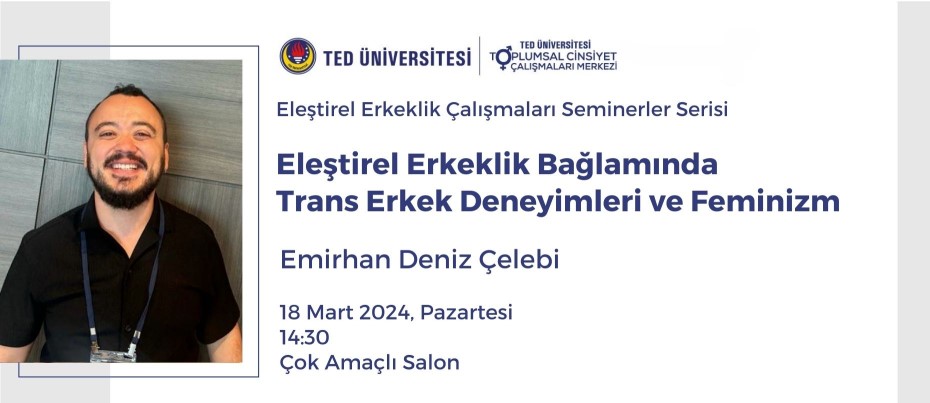
On March 18, 2024, a seminar titled “Trans Male Experiences and Feminism in the Context of Critical Masculinity” was held with Emirhan Deniz Çelebi.
“In this presentation, the topic will begin with a very brief explanation of the basic concepts of gender and then shift the focus to trans subjects. In addition, the concepts of diversity, inclusion, equality, and equity will also be briefly addressed. Narratives based on field observations will be shared regarding the experiences of trans men in Turkish society—who are themselves affected by the circle of hegemonic masculinity—as well as how the perception of trans masculinity is shaped both in the eyes of society and from the perspectives of trans individuals. In light of all this information, the concept of feminism and trans-exclusionary radical feminists will be discussed, and it will be explained—again through field narratives—how the discourse surrounding the gender transition processes of trans men has historically shifted from notions of ‘betrayal of sisterhood’ to ‘self-realization’. All these discussions will be grounded in the idea that the concept of masculinity is not monolithic and that the critical masculinity lens offers a rich and multifaceted perspective. Participants will be invited to reflect on key questions recently debated within feminism, such as: “Who are the subjects of feminism?”, “Should men have a place within feminist discourse?”, and “Who are the subjects of trans feminism?” Within this framework, a reading of critical masculinity beyond cis-het men will be presented.”
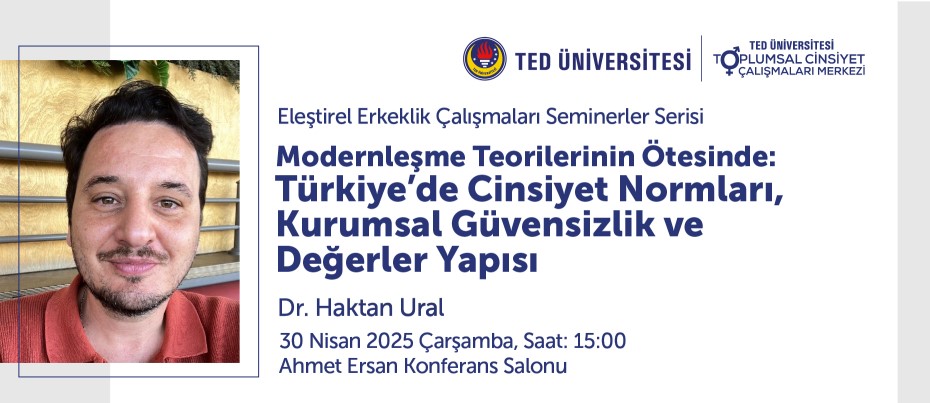
On April 30, 2025, a seminar titled “Beyond Modernization Theories: Gender Norms, Institutional Distrust, and the Structure of Values in Türkiye” was held with Dr. Haktan Ural.
“In contemporary Türkiye, the transformation within the value system has not always reinforced egalitarian tendencies; on the contrary, it has sometimes consolidated traditional gender structures. Rather than weakening, gender hierarchies have been further entrenched through the selective adoption of modernity and have become intertwined with the intensification of ideological polarization. This seminar scrutinizes how public attitudes toward gender norms have evolved, employing Structural Equation Modeling based on data from the 6th (2011) and 7th (2018) waves of the World Values Survey. The comparative analysis reveals that the value structures in Türkiye have diverged over time from the structural trajectories anticipated by modernization theories; as economic and demographic factors lose their explanatory power, ideological determinants have become increasingly prominent. This transformation coincides with the rise of anti-gender discourses in Türkiye. Within political narratives, gender equality is increasingly portrayed as a threat to national identity, moral order, and the authority of masculinity. Symbolic acts, such as withdrawing from the Istanbul Convention, further reinforce this discursive climate. Accordingly, by focusing on the relationship between political ideology and the reconfiguration of masculinity, the seminar underscores the central role of anti-gender movements in understanding resistance to gender equality.”

On December 3, 2025, a seminar titled "An Overlooked Theme in Masculinity Studies: Phallic Culture and Its References" with Asst. Prof. Osman Özarslan.
"Over the last five decades, the culture of masculinity has become a central focus of critique across various disciplines—most notably in social sciences, literature, and cinema—through a pro-feminist lens. This has led to the emergence of Critical Studies on Men and Masculinities. While the trajectories and subject matter of these critiques vary, they primarily concentrate on contemporary and modern expressions of masculinity. One significant area of focus is the complex relationship between masculinity and phallic culture. However, the deeper ontological aspects of phallic culture—often examined through mediums such as discourse, architecture, imagery, and cinema—are frequently overlooked. This study first investigates the emergence of phallism as a religious and belief system central to Prehistoric and Neolithic cosmology, drawing on mythological, anthropological, and archaeological sources. It then examines how this belief system has persisted throughout history—largely through syncretization—and continues to influence contemporary daily life. The analysis is conducted through the lens of Christmas and New Year celebrations, specific faunal festivals, themes of the ‘nazar’ (the evil eye), fertility beliefs, and various cyclical festivities."